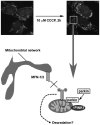PINK1-parkin-dependent mitophagy involves ubiquitination of mitofusins 1 and 2: Implications for Parkinson disease pathogenesis
- PMID: 21139416
- PMCID: PMC4196638
- DOI: 10.4161/auto.7.2.14332
PINK1-parkin-dependent mitophagy involves ubiquitination of mitofusins 1 and 2: Implications for Parkinson disease pathogenesis
Abstract
Mitochondrial dysfunction has long been implicated in the pathogenesis of Parkinson disease (PD). Recent research has highlighted that two proteins encoded by genes linked to familial PD, PINK1 and parkin, play a role in the autophagic degradation of dysfunctional mitochondria (mitophagy). We have recently shown that mitochondrial dysfunction in PINK1-deficient human dopaminergic cells correlates with decreased autophagic flux and can be rescued by parkin expression. Further dissection of PINK1-parkin-dependent mitophagy indicates that the ubiquitination of mitofusins 1 and 2 is an early event. Here, we discuss how ubiquitination of the mitofusins might facilitate mitochondria degradation and the potential for activating mitophagy as a treatment for diseases affecting brain and muscle.
Figures

MeSH terms
Substances
Grants and funding
LinkOut - more resources
Full Text Sources
Medical
